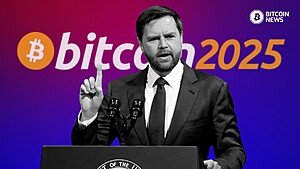In an exclusive interview with comedian Graham Elwood at Orange Pill, Max Keiser, a seasoned Bitcoin advisor and Chairman at Volcano Energy, explored the intricate connection between traditional fiat currencies, wars, and the profound potential of Bitcoin (BTC) as a catalyst for global peace.
The conversation gains significance against the backdrop of Ukraine’s regulatory actions to freeze the accounts and assets of those avoiding military conscription. This sheds light on the coercive power governments hold through centralized financial systems.
The Fiat-War Nexus
Keiser and Elwood argue that the replacement of fiat currencies with Bitcoin could potentially eliminate the motives for wars between nations. The duo critically examined the major role of fiat currency in fueling global conflicts. They posited that fiat currencies, intrinsic to every nation’s economy, become targets in the geopolitical landscape.
They noted that unlike fiat currencies, which are vulnerable to governmental manipulation and inflation, Bitcoin’s decentralized architecture and cryptographic security build an “impenetrable encrypted wall” around a nation’s economic infrastructure.
Elwood emphasized this point by stating:
“With Bitcoin, none of us have to go fight an insane war that just benefits rich people.”
Central Banks: Power Play or Power Nap?
Central banks around the world evidently have a tough stance when it comes to digital assets like Bitcoin. The interview also highlighted this stance and noted central banks’ vested interest in perpetuating wars.
The fundamental connection lies in the issuance of debts, a significant contributor to a bank’s revenue growth. Elwood noted that if Bitcoin were to emerge as the standard currency, the motivation for banks to lend money would diminish. He stated:
“The central banks just want you to keep betting on both teams. They don’t care who wins.”
It is important to note that 2023 was an eventful year for the U.S. economy, marked by a significant shakeup in the American banking sector. Three major banks collapsed simultaneously, creating the largest such crisis in the nation’s history.
Interestingly, amid this financial turmoil, bitcoin showed impressive resilience, even benefiting from the challenges faced by the banking sector.
Max Keiser and Bitcoin’s Potential for Global Peace
Keiser and Elwood envisioned a transformative future where Bitcoin’s widespread adoption triggers a paradigm shift in global relations. In a Bitcoin-secured economy, nations would find little incentive for aggression, leaning towards peaceful resolutions for disputes.
This vision transcends idealism, emphasizing the tangible economic realities presented by a stateless, decentralized currency resistant to government whims and central banking policies. Emphasizing the pivotal role of Bitcoin becoming the global currency, Keiser stated:
“Economics has always evolved in the course of human history as a by-product of wars. If there is no profit in going to war because the money is unconfiscable, then you’re not gonna go to war.”
It is important to note that bitcoin has previously proved to be an important medium for donations during the Russia-Ukraine war, standing as a complementary force alongside Western aid efforts.
The swift integration and adoption of Bitcoin carry the transformative potential to dismantle age-old financial structures, notorious for sustaining global conflicts. Embracing this decentralized currency is not just a call for innovation but a strategic step toward reshaping the narrative of international relations and fostering a more harmonious world.










